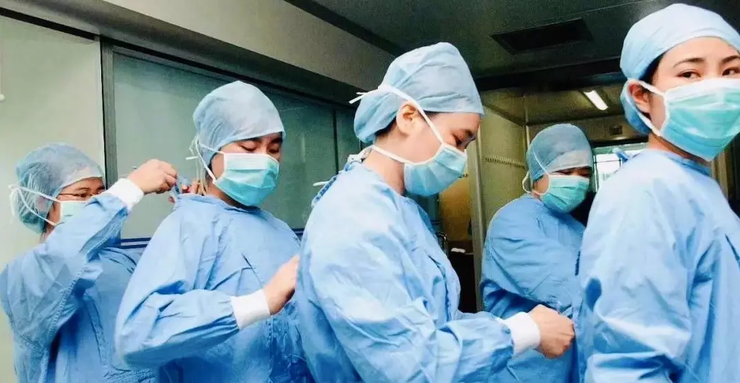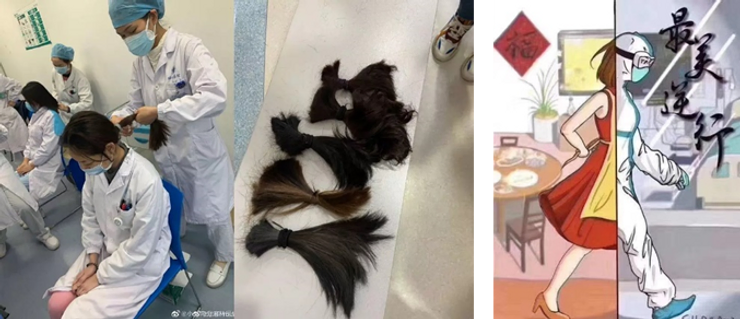China: ‘Female healthcare workers: hidden in plain sight’ By Jingyun ‘Iris’ Pi
On International Nurses Day today and as part of our ASAP Conversations During Covid, we spoke with Youth Champion from China, Jingyun ‘Iris’ Pi who shared with us some of the issues faced by female health workers in the country, during the COVID outbreak and the media’s role in downplaying their contributions in fighting the pandemic.

According to the data collected by the Shanghai Women’s Federation from the medical and health institutions on the battlefront, more than 50% of doctors and over 90% of nurses are female.[1] As stated in Phoenix Network Charity, more than 100,000 female healthcare workers are working in Hubei Province and 5% of them are pregnant.[2] However, the faces and names of female health workers are not included in the media at first. On the contrary, the faces of male health workers can be seen everywhere. On the Weibo accounts of CCTV and Sina Sichuan, only male health workers pictures and names are posted.
As the mainstream media describes the COVID-19 pandemic as a war without smoke, male characters become the go-to posterchild of the coverage – the definition of a hero and fighter – because of deeply ingrained gender stereotypes. This type of reporting is symptomatic of the implicit gender skewed notions in Chinese society. In modern China, women take supportive roles rather than leadership roles despite the fact that they are as well-educated and skilled as men. Based on the profile of China in the World Economic Forum’s Global Gender Gap Report 2020, the female labor force participation rate is 69% and 51.7% of professional and technical workers in the market are female. Additionally, 55.9% of women are enrolled in tertiary education. Despite this, only 16.8% of legislators, senior officials and managers are female. Only 6.5% of women serve in ministerial positions.
Additionally, social media draws a blind eye to women’s remarkable professional achievements. For example, the Chinese Men’s Soccer Team ranks 76th in the 2019 Men’s World Cup[4]compared to the Chinese Women’s Soccer Team #15,[5] but gets more public attention.
Even when the mainstream media captures the images of female health workers, these workers are not shown as professional and skilled doctors and nurses, but instead someone’s mother, wife, or just another girl who snipped her hair and sacrificed her femininity. The media focused on the “sacrifices” that female health workers have made as women. Understandably, the media want to create touching and warm stories to bolster the message of hope and perseverance in such a scary public health emergency. However, the similar “sacrifices” of male health workers do not receive the same attention.
On camera, female health workers are lovely girls who cut their long and beautiful hair and sacrificed their feminine image. They are wives who took off their aprons and left the kitchen to save patients. They are 9-month pregnant women who still choose to stay in the hospital and risk their babies’ lives.[6] They are women who miscarried and choose to come back to join in the battle only 10 days[7] after the death of their babies. They are moms who are still breast feeding but choose to leave their a few months old babies to go back to work. The mainstream media are using women’s bodies to build a selfless hero. In the stories of the media, women are respected not because of their professionalism and skills, but because of their physiology to bear and feed a child. When a woman becomes a saint through her role as a mom, people will take her sacrifices for granted. There is an old Chinese proverb that a woman will be stronger and tougher once she becomes a mother. Stronger people are supposed to take more responsibilities and make more sacrifices than the weak. If a woman refuses to make the same sacrifice, she will undoubtedly be condemned and treated poorly.

In February, a video posted by Daily Gansu’s Weibo account went viral. In this video, 15 female nurses sit in a row to get their hair shaved and weep quietly. They are nurses from the Maternal and Child Health Hospital of Gansu Province going to Hubei Province to join in the epidemic battle in two days. In the Weibo post, they are hailed as the most beautiful ‘heroes in harm’s way’[8]. This media post is one of the excellent existing examples of the mainstream media’s presentation of female health workers. Their sadness, reluctance, dignity, and femininity are entertaining to the public. They are being controlled by the power of public opinion and culture of patriarchy. They became a promotional tool to praise individual sacrifices for collectivism. This reminds me of a school routine performed by some high schools across mainland China, in which female students are advised to cut their hair short and wear unisex school uniforms for the educational purpose of earning more time to study and achieving good academic results. The values and concepts behind this video and school routine are basically the same, which is the individual sacrifices for collectivism and utilitarianism and loss of civic liberty.
The media can use an entirely different perspective to describe these female health workers and their challenges instead of strengthening gender stereotypes. The media can tell the public how many lives female health workers save, how they take care of patients, what new medical findings they discover, and how they train their interns and residents. However, they do not. In this epidemic fight, the media treats male health workers as doctors and nurses, but treats female health workers only as women. The female medical workers use their knowledge and hard work to defend their dignity as a medical worker. Their hard work and efforts need to be seen and their fundamental rights, normal needs, and choices they make need to be treated right. Consuming their body, sacrifice, and pain is a disrespectful act towards professional and skilled female medical workers.
Iris (Jingyun) Pi is the Co-Founder of Stories To Actions which envisions a world where every young person’s voice on their sexual and reproductive health and rights is heard and in which they have equal access to SRHR services, information and resources, even in times of public health emergencies like COVID-19.Iris is a global citizen, who has work, training and volunteer experience in the Philippines, Egypt, the United States of America, Thailand, Vietnam, etc. She was awarded the UNFPA Global Youth Innovation Fellowship (2019) and worked for the UNFPA China office as an Innovator in Mobile Health.
[1] https://mp.weixin.qq.com/s/gjlE_OnTwADhOunMt6Lh3A
[2] https://mp.weixin.qq.com/s/zBdKg_8hRRzDg9Xb6n7N0g
[3] http://www3.weforum.org/docs/WEF_GGGR_2020.pdf
[4] https://www.fifa.com/fifa-world-ranking/ranking-table/men/
[5] https://www.fifa.com/fifa-world-ranking/ranking-table/women/
[6] https://mp.weixin.qq.com/s/AHv93nFVuKjhNPtHZUeAEA
[7] https://news.sina.cn/sh/2020-02-12/detail-iimxyqvz2178181.d.html?from=timeline&isappinstalled=0
[8] https://card.weibo.com/article/m/show/id/2309404474442624401645?_wb_client_=1





